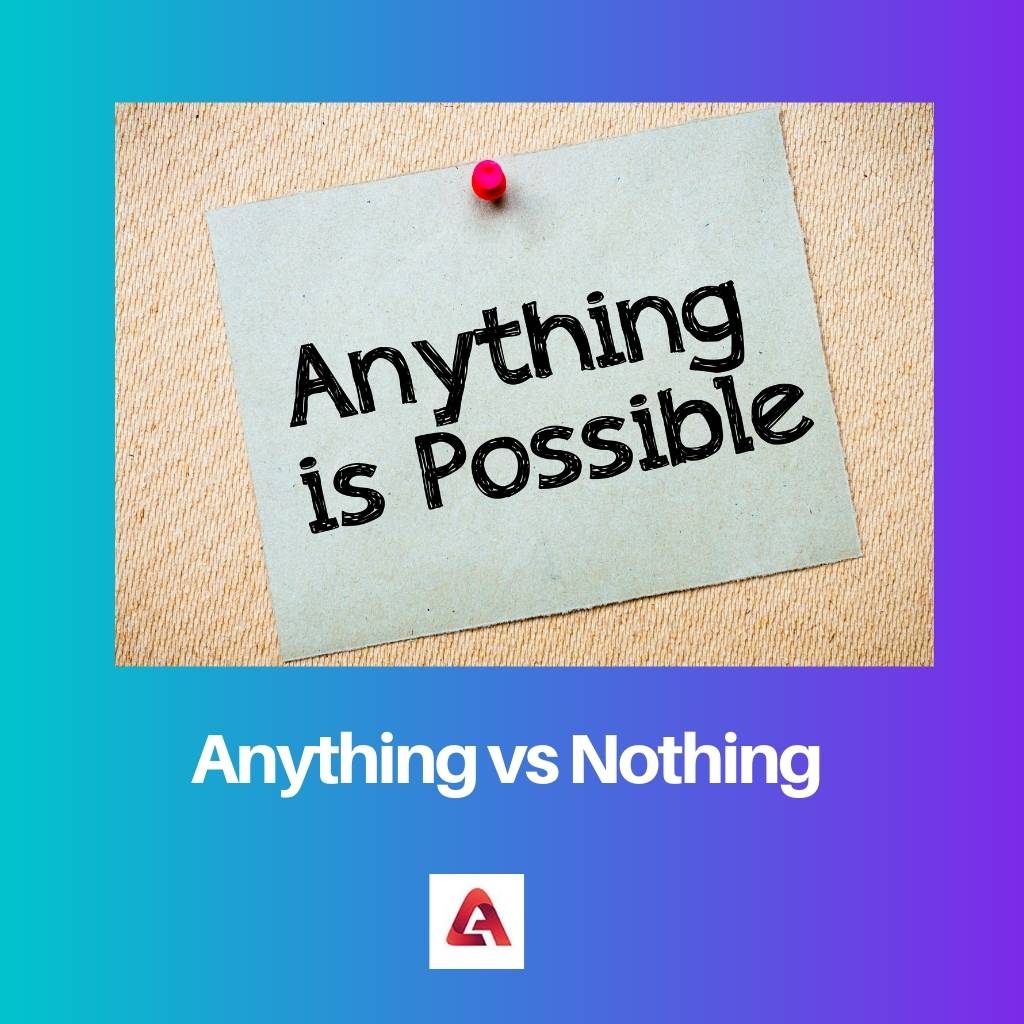Learning new words develops our communication skills; we keep learning new words, but during this, we ignore small details of a few words like ‘Anything’ and ‘Nothing,’ both of which are indefinite pronouns and have a lot of differences between them.
Key Takeaways
- Anything refers to any object or thing regardless of its nature, whereas nothing refers to the absence of any object or thing.
- Anything is inclusive and offers a choice, while nothing implies a lack of options or choices.
- Anything can be used positively or negatively, while nothing has a negative connotation and denotes emptiness or nullity.
Anything vs Nothing
“Anything” implies the presence of something, whereas “Nothing” implies the absence of something. In a philosophical context, “Anything” could be seen as the concept of existence, whereas “Nothing” could be seen as the concept of non-existence.

‘Anything’ is an indefinite pronoun used in place of a noun. It can be an object you can see, any work you do, and any thought, idea, or fact. It is just the presence of these things. It can be used in any sentence but mostly in negative sentences.
‘Nothing’ is also an indefinite pronoun used instead of a noun. It is a lack or absence of anything. It has a negative sense but is mainly used in affirmative sentences. Any negative verb with anything can be used instead of ‘Nothing’ in a sentence.
Comparison Table
| Parameters of Comparison | Anything | Nothing |
|---|---|---|
| Definition | It is the presence of any object, idea, fact, thought, etc. | It is a lack or absence of anything. |
| Etymology | It comprises two words, ‘Any’ + ‘Thing’. | It comprises two words, ‘No’ + ‘Thing.’ |
| Use | It shows the presence of any object, material, thought, fact, etc. | It is used to show absence or lack of anything. |
| Occurrence | It mainly occurs in negative sentences. | It mainly occurs in affirmative sentences. |
| Example | We can do anything with sheer determination. | Nothing is impossible for him. |
What is Anything?
‘Anything’ is a word of two different words, ‘any’ and ‘thing’. It is an indefinite pronoun used in place of a noun. It is used to show the presence of an object you can see or touch or an idea you cannot.
There are a lot of events occurring around us which we can see, we can see and touch objects around us, we can have an idea in our mind which is non-tangible, or there are a lot of facts that we are sure about; these things in singular form can be represented by the word ‘Anything.
‘Anything’ can be used in any context; let’s understand this with some examples:-
- ‘Anything’ is used as an object. For example, I can use anything as a weapon in need.
- ‘Anything’ can be used as an event. For example, I did not do anything on her daughter’s birthday.
- ‘Anything’ can be used as an idea or fact. For example, Do you know anything about mermaids?
Other than these examples, ‘Anything’ can be used in many ways in the sentence. We can practice and learn other uses by practising and using it in daily communications.

What is Nothing?
‘Nothing’ is a word of two words, ‘No’ and ‘thing.’ It is also an indefinite pronoun used in place of a noun. It is used to show the lack or absence of anything.
A negative sentence with ‘Anything’ can be converted into an affirmative sentence using ‘Nothing’ instead of ‘Anything.’
Nothing’ is the concept of non-existence, and it is used in many contexts; Buddhist believe that nothingness will take you to nirvana; on the other hand, atheists use the nothing term to say the non-existence of God.
In mathematics, 0 denotes nothing; in computing, Null, nil, etc., express nothing.
It is also used in many contexts and conditions; let’s understand it with some examples:-
- ‘Nothing’ can be used in the place of an object or anything to show its non-existence. For example, I ate nothing for breakfast.
- Nothing’ is used to deny ideas, thoughts, or facts. For example, I know nothing about these machines.
- ‘Nothing’ is used for the absence of any event. For example, She was doing nothing in the office.
These are just a few examples of the uses of ‘Nothing.’ It can also be used in different types of sentences in many ways that we can learn by practice.

Main Differences Between Anything and Nothing
- The main difference between ‘Anything’ and ‘Nothing’ is that Anything is the presence of an idea, event, thought, or fact, but ‘Nothing’ is the lack or absence of anything.
- Both ‘Anything’ and ‘Nothing’ have ‘Thing’ words in common, but their prefixes are different, making them different.
- ‘Anything’ is mainly used in negative sentences. On the other hand, ‘Nothing’ is mainly used in affirmative sentences.
- ‘Anything’ is a term used to show the existence of an object, matter, fact, etc., whereas the ‘Nothing’ word indicates the non-existence of any idea, thing, fact, etc.
- ‘Anything’ can be used in place of ‘Nothing’ by using a negative term before ‘Anything,’ but vice versa is not valid.




